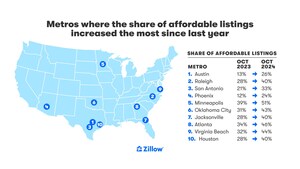Recessions Typically Have Limited Effect on the Housing Market
Other than the housing-led Great Recession, recent national and statewide recessions have not caused widespread home value declines
- U.S. home values plummeted during the Great Recession, but broadly continued to rise faster than inflation during the dot-com crash in 2001.
- Excluding the Great Recession, annual home value appreciation across all states since 1997 has averaged 4.6% during times of economic growth and 4% during recessions.
SEATTLE, Aug. 6, 2019 /PRNewswire/ -- Other than the housing-led Great Recession of the late 2000s, home values have typically continued to grow through national and statewide recessions over the past quarter-century. This according to a new analysis by Zillow®.
The U.S. reached its longest-ever economic expansion this summer, though growth is slowing. A recent survey sponsored by Zillow and conducted by Pulsenomics LLC found that a panel of housing experts and economists most often expect the next recession to begin in Q3 2020. Demand for homes is expected to cool during the next recession, but few believe a housing slowdown will be a significant factor in causing it.
As some market observers predict a recession on the horizon, an analysis of recessions from the recent past shows that they often have a limited effect on the housing market. In the past 23 years, there have been two national recessions – the dot-com crash from March to November 2001 and the Great Recession from December 2007 to June 2009i – and several statewide or regional recessionsii. Home values broadly fell across the country during the Great Recession, but in most other cases annual home value growth remained positive.
Excluding the Great Recession, there have been 1,039 instances since 1997 of states being in a recession during a given month. Annual home value appreciation was positive 81% of the time in these months – an identical rate to months in which states were in economic expansion. Appreciation averaged 4.6% during economic growth and 4% during recessions. This indicates that while recessions do have an impact on the housing market, the widespread collapse of home values during the Great Recession is an outlier.
"The housing crash during the Great Recession left a lasting impression on our collective memory," said Zillow Economist Jeff Tucker. "But as we look ahead to the next recession, it's important to recognize how unusual the conditions were that caused the last one, and what's different about the housing market today. Rather than abundant homes, we have a shortage of new home supply. Rather than risky borrowers taking on adjustable-rate mortgages, we have buyers with sterling credit scores taking out predictable 30-year fixed-rate mortgages. The housing market is simply much less risky than it was 15 years ago, and our experience in recent localized recessions shows how home prices can weather normal economic headwinds."
As an example, several states with large energy sectors – Alaska, Louisiana, North Dakota, Oklahoma and Wyoming – experienced local recessions starting in 2015 when oil prices fell dramatically. Home value growth was positive year-over-year across all five states and only Alaska turned negative month-over-month during this time period – the largest monthly loss in value for the median home in Alaska was $700. Nationwide, annual home value growth averaged 4.3% during these recession months compared to 5.2% average growth during months of economic expansion in 2015 and 2016.
About Zillow
Zillow® is transforming how people buy, sell, rent and finance homes by creating seamless real estate transactions for today's on-demand consumer. Zillow is the leading real estate and rental marketplace and a trusted source for data, inspiration and knowledge among both consumers and real estate professionals.
Zillow's proprietary data, technology and industry partnerships put Zillow at nearly every major point of the home shopping experience, helping consumers search for and get into their new home faster. Zillow now offers a fully integrated home shopping experience that includes access to for sale and rental listings, Zillow Offers®, which provides a new, hassle-free way to buy and sell eligible homes directly through Zillow; and Zillow Home Loans, Zillow's affiliated lender that provides an easy way to receive mortgage pre-approvals and financing. Zillow Premier Agent instantly connects buyers and sellers with its network of real estate professionals to help guide them through the home shopping process. For renters, Zillow's innovations are streamlining the way people search, tour, apply and pay rent for leased properties.
In addition to Zillow.com, Zillow operates the most popular suite of mobile real estate apps, with more than two dozen apps across all major platforms. Launched in 2006, Zillow is owned and operated by Zillow Group, Inc. (NASDAQ:Z and ZG) and headquartered in Seattle.
Zillow and Zillow Offers are registered trademarks of Zillow, Inc.
i Dates according to the National Bureau of Economic Research.
ii The Bry-Boschan method was used to estimate statewide recessions, based on monthly State Coincident Indexes published by the Federal Reserve Bank of Philadelphia. In this analysis, we allowed for a minimum business cycle of 12 months and a six-month threshold for each phase of the business cycle. We then reviewed Zillow Home Value Index movements at the state-month level during these estimated statewide recessions to assess what has historically happened to home values during recessions.
SOURCE Zillow

WANT YOUR COMPANY'S NEWS FEATURED ON PRNEWSWIRE.COM?
Newsrooms &
Influencers
Digital Media
Outlets
Journalists
Opted In






Share this article